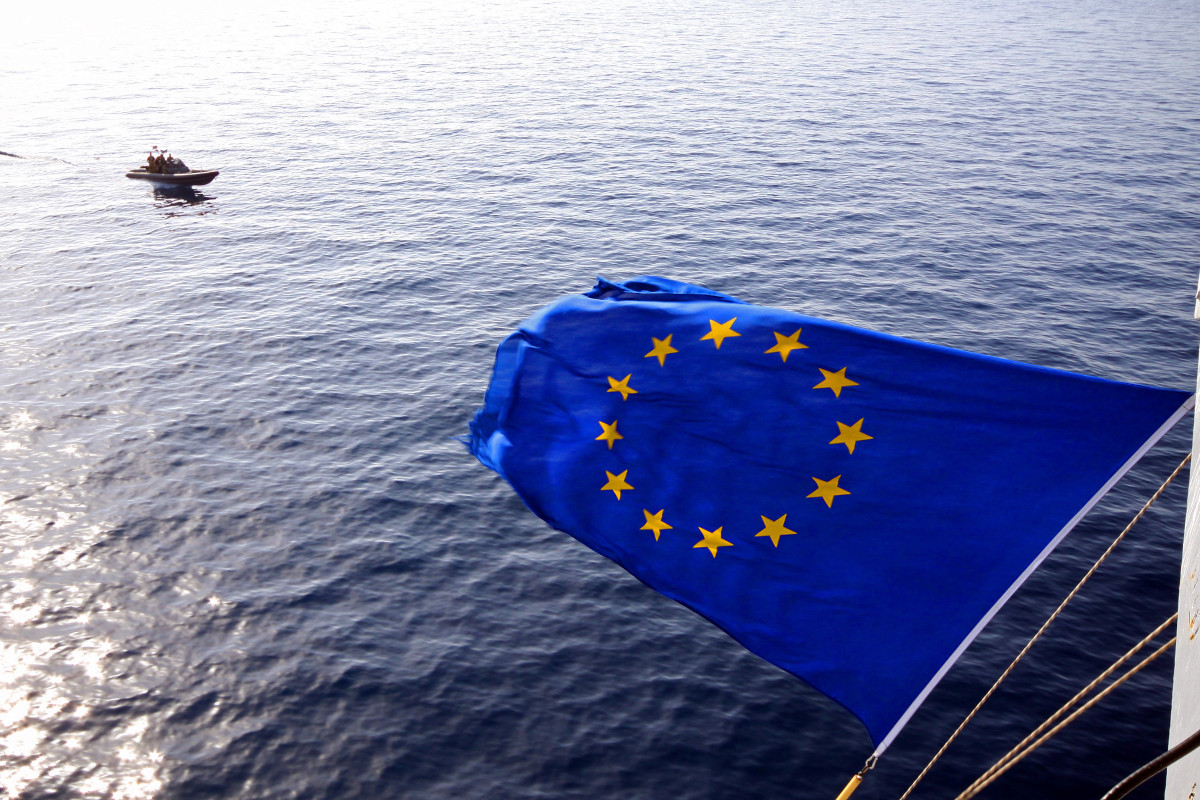Policing migration: when “harm reduction” means “multipurpose aerial surveillance”
Topic
Country/Region
09 April 2024
The EU’s latest “operational action plan” on migrant smuggling gives a central role to Europol, which will receive data resulting from more than two dozen joint police operations launched by EU member states, EU agencies and a range of non-EU states. The UK is heavily involved in the plan, and is leading one activity. One objective is for harm reduction and assistance to victims, but the only activity foreseen is for Frontex to increase use of its “EUROSUR Fusion Services, including the Multipurpose Aerial Surveillance aircraft service.”
Support our work: become a Friend of Statewatch from as little as £1/€1 per month.

Image: jjprojects, CC BY-SA 2.0
Police against people smuggling
The action plan (pdf) covers the 2024-25 period and contains an outline of 25 activities listed under eight strategic goals, but offers no insight into the causes of human smuggling, and none of the activities are framed at addressing causes.
The overall aim is to control migration flows both into the EU and within the EU, and to enhance police cooperation between national law enforcement authorities, EU agencies (Europol, Frontex and the EU police database agency, eu-LISA) and with countries outside the EU, through joint operations and the exchange of information and intelligence.
Many of the activities include targets for arrests: one led by Poland, for example, foresees the arrest of 200 facilitators of irregular migration per year; another, led by Cyprus, expects at least 1,000 “apprehensions/arrests”.
In 2015, Statewatch exposed a planned EU-wide police operation against irregular migrants called ‘Mos Maiorum’, which led to significant media coverage and political controversy, as well as numerous actions to inform people of their rights and to try to map police activities. Since then, the number of such operations has skyrocketed, but attention has dwindled.
European plan
The 2024-25 plan is part of the European Multidisciplinary Platform Against Criminal Threats, a now-permanent initiative through which joint police operations are coordinated. It is managed by Europol, with political control exercised by the member states in the Council of the EU.
A “leader” is assigned to each activity in the action plan, responsible for initiating and reporting on the relevant activity, with “key performance indicators” often indicated in respect of each one.
The leaders include nine EU member states (Austria, Cyprus, France, Germany, Greece, Italy, Poland, Portugal and Spain), the UK, as well Frontex, Europol, eu-LISA and the European Police College (CEPOL).
Europol will provide overall support across all the different activities and is specifically responsible for leading four activities.
In many activities led by national police forces, it is specified that a goal is also to participate in other Europol initiatives, such as the “Europol Cyberpatrol to target and identify targets” and Europol’s European Migrant Smuggling Centre. The Operational Action Plan stipulates that other, unspecified, “Europol tools” may be used “where appropriate”.
The action plan specifies that the operational data emanating from the activities is to be shared with Europol to be processed through its Analysis Projects, further swelling the databases at its headquarters in The Hague.
The first version of the action plan was circulated amongst member states two weeks before the European Commission published a proposal to reinforce Europol’s powers in relation to migrant smuggling, arguing that they were urgently needed – though this assessment was not shared by the member states.
Strategic goals
The 26 activities outlined in the plan are designed to contribute to eight strategic goals:
- Criminal intelligence picture. The activities under this heading are for Europol to provide a “situational picture of migrant smuggling” including threat assessments, updates on migratory routes, “modi operandi” and future trends, which will be made available to member states and third countries. It will involve sharing information with Frontex. Europol also aims to “strengthen the strategic and tactical intelligence picture on the use/abuse of legal business structures by criminal networks” not only in respect of migrant smuggling, but throughout “all main crime areas affecting the EU”.
- Investigations and judicial response. There are 11 activities planned in relation to this goal. The objective is to prepare and conduct investigations and prosecutions. Police forces of different member states lead the activities and set out specific targets by reference to the numbers of arrests, initiated investigations and identified networks. Each planned activity appears to reflect specific national or local police force priorities. Germany for instance aims to “detect 5,000 irregular migrants” per year, and arrest 500 “facilitators”, whilst France focuses on seizing 100 small boats crossing the Channel to the UK. Spain focuses on air routes, including links between human smuggling and drug trafficking; and Portugal’s aim is to disrupt “marriages of convenience abuse and associated threats” (400 cases specifically). Europol also leads an activity aimed at the development of “intelligence products in support of MS investigations” (50 per year) and Frontex aims to focus on border checks and surveillance measures on the EU external borders (with 1,000 “apprehensions/arrests”).
- Coordinated controls and operations targeting the online and offline trade in illicit goods and services. The only activity planned in relation to this goal is by the French police forces, to improve law enforcement response against “those utilising the Dark Web and other internet messenger applications to enable illegal immigration and document fraud”. The dark web is identified as an “intelligence gap” in this context.
- Criminal finances, money laundering and asset recovery. Led by the UK, the activity planned under this goal heading is to disrupt money flows specifically within hawaladar networks.
- Document fraud. Frontex, as well as French and German police forces each lead activities under this goal aimed at “targeting networks or individuals” involved in document fraud. In this respect, Frontex’s “Centre of Excellence for Combating Document Fraud” has a key role.
- Capacity building through training, networking and innovation. This involves activities aimed at improving the skills, knowledge and expertise of law enforcement and judicial authorities, led by CEPOL, eu-LISA (on the use of SIS and Eurodac databases) and German police forces.
- Prevention, awareness raising and harm reduction, as well as early identification and assistance to victims. The only goal that is expressed as being aimed at improving the safety of people is led by Frontex, and is focused on the detection of migrant smuggling through the “use of EUROSUR Fusion Services, including the Multipurpose Aerial Surveillance aircraft service, for [member states] and stakeholders to support more effective detecting, preventing and combating illegal immigration and migrant smuggling.” No mention is made of identification, assistance or victims.
- Cooperation with non EU partners: under this last goal, one activity is led by Austrian police forces, aimed at expanding the geographical focus of the Task Force Western Balkans to Turkey and “other relevant countries of origin and transit”. The work is already based on intelligence information provided by Europol and Frontex and aims to “enhance mobile phone extractions” (the link here is not clear). The second activity listed under this last goal is led by Europol, and aims to provide a “common platform for EU agencies, military, law enforcement and other stakeholders to exchange intelligence on criminal networks operating along the migration corridors”, creating a broad and focal role for itself in information exchange with a wide range of stakeholders, including private companies.
For the purposes of the Operational Action Plan, “migrant smuggling” is broadly defined as:
“…the process of facilitating the unlawful entry, transit or residence of an individual in a country with or without obtaining financial or other benefits. Migrant smuggling entails the facilitation of illegal entry to the EU and of secondary movements within the EU. It can also involve facilitating the fraudulent acquisition of a residence status in the EU.”
It therefore does not require the involvement of any benefit and includes movements within the EU.
Documentation
- Operational Action Plan 2024-2025: Migrant smuggling
Our work is only possible with your support.
Become a Friend of Statewatch from as little as £1/€1 per month.
Further reading

Expansive new police powers hidden behind EU’s migrant smuggling proposals
At the end of November, the European Commission announced two new laws to fight migrant smuggling. One seeks to make the legal framework more punitive. The other aims “to reinforce Europol’s role in the fight against migrant smuggling and trafficking in human beings,” but would in fact expand Europol’s powers in relation to all crimes for which it has competence, and let the agency conduct “non-coercive investigative measures” during joint operations with national police forces. Its staff are currently prohibited from conducting any kind of investigative measure.

People-smuggling profits at historic high, EU concedes
EUobserver, 28 November 2023.

EU: More surveillance, funding and operational cooperation to fight migrant smuggling
A Spanish presidency note to member state representatives in the Council identifies cross-border organised crime as a key threat to the correct functioning of the Schengen area, calling for additional impetus in 2023-2024 to fight “cross-border, serious and organised crime”. Crimes involving smuggling and exploitation (including of children, trafficking, sexual exploitation) are deemed challenges for external border management and the Schengen area.
Spotted an error? If you've spotted a problem with this page, just click once to let us know.

